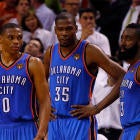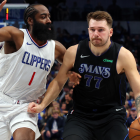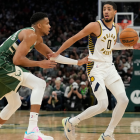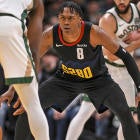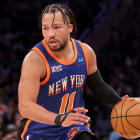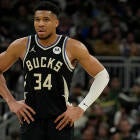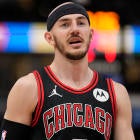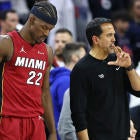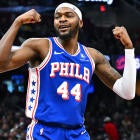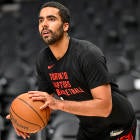When a team lands the No. 1 or No. 2 pick in the NBA Draft lottery, executives, fans and players alike rejoice. It's the chance for what was likely a bad team to have its fortunes turned around with the arrival of a transcendent, franchise-changing player.
The theory of the lottery is simple -- give the worst teams the chance to take the best new players and eventually they'll get better as the good teams get worse, creating parity in the league and a constant shuffling of contenders.
In theory it works, but in practice -- history says it hasn't.
Since the lottery began in 1985, only four No. 1 picks have led the team that drafted them to an NBA championship: David Robinson, Tim Duncan, LeBron James and Kyrie Irving.
Robinson never won a title without Duncan, but Duncan won three without Robinson. So technically Duncan is the only No. 1 pick without a second No. 1 pick on the team to lead his original franchise to a title. LeBron left Cleveland before he won a title, spent four years in Miami and waited for the Cavs to assemble the necessary pieces (one of which was Irving) before rejoining them and leading them to a championship in 2016.
For No. 2 picks, it's even worse. The only two second picks since 1985 to win a title with the team that drafted them are Darko Milicic with the 2004 Pistons -- he averaged just 4.7 minutes for that team as an 18-year-old rookie -- and Jason Kidd, who won a title with the Mavericks 17 years after they drafted him.
Meanwhile the Warriors have won two of the last three titles with a core of players they drafted at No. 7 (Stephen Curry), No. 11 (Klay Thompson) and No. 35 (Draymond Green).
You'd think that over the course of 32 years we'd have more No. 1 or No. 2 picks lead their franchise to the ultimate success. Is the lottery not working? Why do teams that are constantly being rewarded with their pick of the best young players fail to improve? Here are three major problems to examine.
The Kings problem -- you draft poorly
The Sacramento Kings haven't gotten a No. 1 or No. 2 pick recently, but they perfectly illustrate the inherent issue with relying on draft picks to improve: If you select the wrong players, you can be bad for a really long time. The Kings have had five top-10 draft picks since selecting DeMarcus Cousins in 2010, and here are the players they took with those picks:
| Year | Pick | Player |
| 2011 | 10 | Jimmer Fredette |
| 2012 | 5 | Thomas Robinson |
| 2013 | 7 | Ben McLemore |
| 2014 | 8 | Nik Stauskas |
| 2015 | 6 | Willie Cauley-Stein |
The only players remaining on the team are Ben McLeMore and Willie Cauley-Stein and, while they're still young, neither appears capable of even being even the third-best player on a championship team.
Despite all of the relatively high draft picks, the Kings haven't made the playoffs since 2006. Were it not for finding an absolute gem with the very last pick in the 2011 draft in Isaiah Thomas (whom they traded before he became an All-NBA guard for the Celtics), their records in those seasons would have been even worse.
Sacramento traded Cousins, its only All-Star, last season and began a full rebuild, so they'll likely be drafting in the top 10 for a few more years, at least. Their climb out of the cellar is going to have to start with making better draft picks.
The LeBron problem -- your rookie is actually too good
This one is rare, but LeBron James is the best example. This is what happens when the player a team drafts is so good that he actually ends up hurting its long-term prospects. The Cavs won 17 games the year before they drafted LeBron with the No. 1 pick. The next year, with LeBron, they won 35 games, nearly made the playoffs, got the No. 10 pick in the draft and selected ... Luke Jackson. The next season they won 42 games and had already traded away their lottery pick, which would have been No. 13. Just two seasons in LeBron's NBA career, and because he made them so much better they were unable to surround him with the potential talent that a top-five pick would bring. James eventually led the team to the Finals in 2007 with an inferior roster of players like Drew Gooden, Larry Hughes and Daniel "Boobie" Gibson, but the lack of good, young players surrounding him was part of the reason he infamously left for Miami in 2010.
Something similar happened with the Orlando Magic, when they won the NBA Draft Lottery in 2004 after winning 21 games and selected Dwight Howard No. 1 overall. Thanks in large part to Howard, the Magic improved to 36 wins the next season and earned the No. 11 pick (which they used on Fran Vazquez, an international player who has yet to play in the NBA). The following season, they got the No. 11 pick again, and used it on J.J. Redick -- a solid player but not capable of being the second star for the Magic. Despite a Finals appearance in 2010, Howard eventually grew frustrated with the lack of talent around him and demanded a trade. He was eventually shipped off to the Lakers.
So even when a team makes the right pick at No. 1 and that player is so good that he leads the team to more and more wins, it can cripple the team's chances of surrounding him with the necessary talent to win a title. It seems a bit counterproductive.
The OKC problem -- you draft too well
After years of futility, the Seattle SuperSonics/Oklahoma City Thunder put together arguably the three best drafts in NBA history from 2007-2009. In consecutive years the franchise selected Kevin Durant, Russell Westbrook and James Harden. Yes, the 2014 MVP and two of the three 2017 MVP finalists were all on the same team -- and they never won a title. That's because, after making the NBA Finals with the trio of early 20-somethings in 2012, the Thunder were forced to make a decision. Do we keep our three stars, tying up nearly all of our salary and making it difficult to add significant role players? Or do we trade one of them, collect future assets and add flexibility? Obviously we know which decision the Thunder made, sending Harden to Houston where he has become a three-time first-team All-NBA guard. But the future didn't go the way that OKC planned, and Durant left the team for the Warriors in the summer of 2016. Westbrook is the only one left -- trying to single-handedly lead the Thunder back to prominence.
So even if the 76ers' "process" works out and their three young stars -- Joel Embiid, Ben Simmons and (likely after Thursday's draft) Markelle Fultz -- all turn out to be superstars, they're going to be faced with the same problem as the Thunder at some point down the road, almost certainly before they win a title.
Conclusions
Winning in the NBA is really hard -- we all know it, but looking at how seldom top draft picks lead their team to titles really sheds light on the concept.
If you don't draft well, you lose. If the player you draft is too good, you lose. If you hit an absolute home run with three straight draft picks, you lose. Clearly there are some issues with the current lottery system's approach to making bad teams more competitive. The question becomes, is there a better way?













